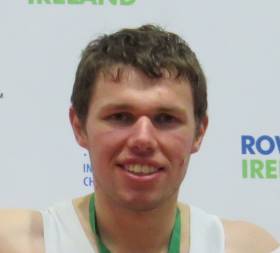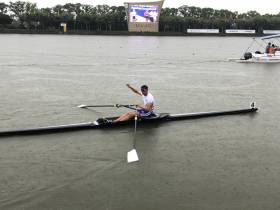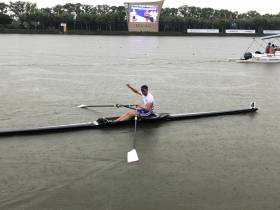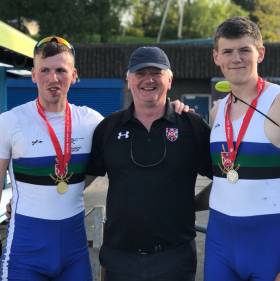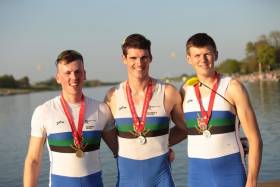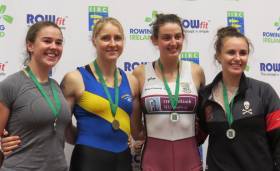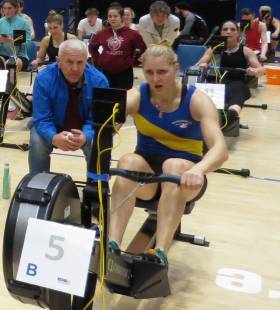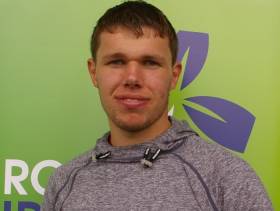Displaying items by tag: Sam McKeown
Queen's Shine at Lagan Scullers' Head of the River
#Rowing: Queen’s had a good day at the Lagan Scullers’ Head of the River in Belfast on Saturday. Sam McKeown was the fastest single sculler in the first head, and was most closely matched by three other men from his college club. Queen’s also had the fastest quadruple and double on the day.
Lagan Scullers’ Head, Saturday (Draft Results; selected)
Head One: 1 Queen’s (S McKeown; men’s senior single) 12 mins 15.8, 2 Queen’s (M Taylor, sen single) 12:49.7, 3 Queen’s (R Corrigan) 13:03.9; 5 Enniskillen RBC jun 16 double (T Murphy) 13:12.6, 7 Enniskillen jun 15 coxed quad (D Howe) 13:16.1; 15 Methody (C Purdy; jun 18A single) 14:13.8; 30 Bann (K Shirlow; women’s intermediate single) 15:06.3, 31 Belfast BC jun 18A women’s double (S Gordon) 15:07.8. 60 Coleraine GS (G Lenaghan; women’s jun 15 single) 16:36.6.
Head Two: Queen’s men’s sen quad (M Taylor) 11:01.3; 3 Methody men’s jun 16 quad (T Fleming) 13:08.1; 8 Enniskillen jun 18 double (J Timoney) 14:29.2; 9 Bann (A Christie; inter single) 14:31.1; 16 Belfast BC women’s jun 16 coxed quad 15:05.7; 19 Queen’s (R Smylie; women’s sen single) 15:28.3; 25 Belfast BC (L McCoy; women’s jun 18A single) 16:16.5; 27 Belfast RC (K Foster; men’s club two single) 16:24.8. 34 Carrick on Shannon women’s jun 15 quad 17:07.1. 36 Belfast BC women’s novice double 17:16.0; 42 Enniskillen (L Paton; men’s jun 15 single) 17:35.5. 51 Queen’s (C Hagan; men’s nov single) 18:30.4
Head Three: 1 Queen’s men’s sen double (H Moore) 12:30.4, 2 Enniskillen RBC jun 18A quad (J Timoney) 13:07.8; 7 Belfast BC women’s jun 18A quad (P Mullan) 14:13.3; 10 Methody men’s jun 18B coxed quad (A Waly) 14:31.0; 15 Carrick on Shannon (T Ó Donaile; men’s jun 16 single) 15:41.0, 16 Coleraine GS men’s jun 15 double (O Leitch) 15:41.9, 19 Belfast BC women’s jun 16 double (K Dick) 15:59.8; 40 Lagan Scullers’ women’s jun 15 double (E Darby) 17:04.4.
McKeown's Gold in China Brings Another Reward
#Rowing: The Rower of the Month for August is Sam McKeown. The Queen’s University, Belfast, student won gold in the single sculls final at the World University Rowing Championships in Shanghai. The Portadown man, representing Britain, came in ahead of Chinese and Finnish opponents.
It was another month when Irish rowers were prominent: a young team represented Ireland at the World Junior Championships, while Paul and Gary O’Donovan added a silver medal to their haul as they headed up the Ireland team at the European Championships.
Rower of the Month awards: The judging panel is made up of Liam Gorman, rowing correspondent of The Irish Times and David O'Brien, Editor of Afloat magazine. Monthly awards for achievements during the year will appear on afloat.ie. Keep a monthly eye on progress and watch our 2018 champions list grow.
Gold for McKeown of Queen's at World University Rowing
#Rowing: Sam McKeown of Queen’s University, Belfast, won gold in the single sculls at the World University Rowing Championships in Shanghai. McKeown, representing Britain, topped the podium, with China’s Zhi Chen and Joel Naukkarinen of Finland taking silver and bronze.
Fisu World University Rowing Championships, Shanghai
Men
Single Sculls – A Final: 1 Britain (S McKeown) 6:57.74, 2 China (Chen Zhi) 7:00.24, 3 Finland (J Naukkarinen) 7:03.89.
Gold for Queen's University at BUCS Rowing Regatta
#Rowing: Queen’s University won the Championships Quadruple at the BUCS Regatta in Nottingham today. The crew of Nathan Hull, Sam McKeown, Philip Doyle and Tiernan Oliver beat Reading into second and Oxford Brookes into third. The Queen’s women’s Beginners’ eight took silver in their race.
BUCS Regatta, Nottingham (Selected Results; Irish interest)
Men
Sculling, Quadruple – Championship: 1 Queen’s (N Hull, S McKeown, P Doyle, T Oliver) 6:05.57, 2 Reading 6:08.22, 3 Oxford Brookes 6:10.22.
Women
Eight – Beginners’: 1 Edinburgh 7:15.28, 2 Queen’s 7:24.25.
Queen's in the Medals at BUCS Rowing Regatta
#Rowing: Queen’s University, Belfast, launched a very successful raid on the medals available on the first two days of the BUCS Regatta in Nottingham.
Queen’s had a very successful Saturday. They won the Beginners’ coxed four, and their talented group of scullers also shone. Philip Doyle took silver in the Championship single, while Sam McKeown took fourth. In the intermediate single, Queen’s took gold and silver, through Tiernan Oliver and Nathan Hull.
This foursome were again on song on Sunday. McKeown and Doyle took silver in the Championship double, and Hull and Oliver matched them. Fiona Bell also made the podium in the women’s Championship single scull, taking bronze.
BUCS (British University) Regatta, Nottingham (Selected Results; Irish interest)
Saturday
Men, Four – Beginners’, coxed: 1 Queen’s 7:10.49.
Sculling, Single – Championship: 1 Edinburgh (J Armstrong) 7:20.99, 2 Queen’s (P Doyle) 7:22.01; 4 Queen’s (S McKeown) 7:27.73. Intermediate: 1 Queen’s (T Oliver) 7:37.48, 2 Queen’s (N Hull) 7:37.66.
Sunday
Men, Sculling, Double – Championship: 1 Reading 6:40.76, 2 Queen’s 6:43.56. Inter: 1 Reading 6:55.04, 2 Queen’s 7:00.91.
Women
Sculling, Single – Championship: 1 Edinburgh 8:09.20; 3 Queen’s 8:26.50.
Puspure Honoured as Women Produce Good Results
#Rowing: The Afloat Rower of the Month for January is Sanita Puspure. The Old Collegians competitor produced a creditable time of six minutes 39.8 seconds for 2,000 metres at the Irish Indoor Rowing Championships. Sam McKeown beat his own time to set a new record of 5:53.0 and lead the men’s rankings, while Puspure headed up a good set of performances by women. Aileen Crowley, Emily Hegarty, Aifric Keogh and Fiona Murtagh all recorded figures under seven minutes.
Rower of the Month awards: The judging panel is made up of Liam Gorman, rowing correspondent of The Irish Times and David O'Brien, Editor of Afloat magazine. Monthly awards for achievements during the year will appear on afloat.ie. Keep an eye on progress and watch our 2018 champions list grow.
McKeown and Puspure Best at Irish Indoor Rowing Championships
#Rowing: Sam McKeown set a new Irish record of five minutes 53 seconds at the Irish Indoor Rowing Championships at the University of Limerick today. The Queen’s University man was the only competitor to breach the six-minute mark.
In the women’s competition, Sanita Puspure ruled. Her time of 6:39.8 was not her best, but she had almost 12 seconds to spare over Aileen Crowley, who was hitting a new personal mark. Emily Hegarty won the women’s under-23 section and Conor Egan the men’s.
Denise Walsh was the best lightweight woman on the day, while Aoife Hegarty the best under-23 lightweight. Aodhan Burns topped the men’s open lightweight ranks, which were very spare, while Jake McCarthy bettered his twin, Fintan, in the men’s under-23 lightweight competition.
The best juniors were Alex Byrne of Shandon and Zoe McCutcheon of Enniskillen.
Irish Indoor Rowing Championships, University of Limerick, Saturday (Selected Results)
Men
Open: S McKeown 5:53.0. Under-23: C Egan 6:08.1. Jun 18: A Byrne 6:15.0. Jun 16: A Sheehan 6:47.3.
Lightweight Open: A Burns 6:29.9. Lightweight Under-23: J McCarthy 6:22.2.
Women
Open: S Puspure 6:39.8. Under-23: E Hegarty 6:56.7. Jun 18: Z McCutcheon 7:19.7. Jun 16: M Curry 7:21.0
Lightweight Open: D Walsh 7:13.4. Lightweight Under-23: A Casey 7:18.1.
#Rowing: Irish rowers won two medals at the European Universities (EUSA) Rowing Championships in Subotica, Serbia. Single sculler Sam McKeown and the lightweight men’s double of Miles Taylor and Chris Beck took bronze medals for Queen’s University. The crosswind and cross headwind made conditions difficult.
European Universities Rowing Championships, Subotica, Serbia (Irish interest)
Men
Lightweight Double Sculls – A Final: 3 Queen’s University, Belfast (M Taylor, C Beck) 7:54.24.
Single Sculls – A Final: 3 Queen’s University, Belfast (S McKeown) 8:51.42.
McKeown Crashes Through Six Minutes to Set New Irish Record
#Rowing: Paul O’Donovan set a new personal best – by just .1 of a second - and was the top lightweight at the Irish Indoor Rowing Championships today. The outstanding peformance of the day at the University of Limerick belonged, however, to heavyweight oarsman Sam McKeown. The Queen’s University oarsman was by far the fastest on the day, with a time of five minutes 55 seconds. This was the second occasion on which he had broken six minutes (he had covered the 2,000 metres in 5:59 in November) and he looked in control at the finish, shouting “Go Queen’s!”
Sanita Puspure was the fastest woman, clocking six minutes 40 seconds with a steady peformance. Her nearest rival was Monika Dukarska – 6:52.6 was a personal best for the Killorglin woman.
Ross Corrigan from Enniksillen Royal College (formerly Portora) was the fastest junior man – of 125 – and Hannah Scott of Bann took the honours amongst junior women.
In the under-23 men’s competition, another win for Daire Lynch confirmed his strong transition from junior ranks; UCD man Shane O’Connell, whose star has also been on the rise, won the under-23 lightweight grade in a good battle with Jake McCarthy and Fintan McCarthy.
Emily Hegarty of Skibbereen was the top woman at under-23 level. Her nearest rival was Eimear Lambe, who pipped her elder sister, Claire, by half a second. The Ireland Olympian who is now at Cambridge University competed as a heavyweight as she prepares for the Boat Race.
Competitors had to leave the venue late in the programme after a fire alarm. They were able to return to finish events.
Irish Indoor Rowing Championships, University of Limerick, Saturday (Selected Results):
Men – Open: 1 S McKeown 5 min 55.0 sec, 2 E O’Connor 6:02.7, 3 T Oliver 6:03.9. Lightweight Open: 1 P O’Donovan 6:07.4, 2 G O’Donovan 6:14.2, 3 M O’Donovan 6:19.0, 4 S O’Driscoll 6:21.1. Under-23: D Lynch 6:10.0. Lightweight Under-23: S O’Connell 6:21.3. Junior 18: R Corrigan 6:21.3. Jun 16: M Gallagher 6:38.6.
Women – Open: 1 S Puspure 6:40.0, 2 M Dukarska 6:52.6, 3 B Larsen 7:02.5, 4 C Lambe 7:11.4. Lwt: D Walsh 7:13.1. Under-23: E Hegarty 6:57.5; Lwt U-23: E McGiff 7:38.6. Jun 18: H Scott 7:05.7. Jun 16: Z McCutcheon 7:18.2.
# Sam McKeown of Portadown set a time of six minutes 4.7 seconds, the fastest at the Ulster Indoor Championships at Queen’s University, and a personal best for the under-23 competitor. In Limerick, Richard O’Hagan won the open and 500 metres categories at the Irish Provinces Indoor Championships, with times of 6:09.4 and 1:19.6. NUIG had a good day, and Liam Keane (also under-23) was the fastest lightweight.
Junior 18 competitor Ronan Byrne of Shandon set a new record for the 2,000 metres of 6:16.9, while fellow junior Eoghan Walls-Tuite set an excellent time of one minute 22.3 seconds for 500 metres.
Monika Dukarska of Killorglin was the fastest woman, and Siobhán McCrohan the fastest lightweight woman.
Irish Provinces Indoor Rowing Championships, University of Limerick (Selected Results; 2000 metres unless stated)
Men
Open – 1 R O’Hagan 6:09.4, 2 F Crowley 6:24.9, 3 A Prendergast 6:25.5. 30-39: G Conway 6:19.7. Open 500: R O’Hagan 1:19.6.
Under-23: A Kinneen 6:20.2. Junior 18: R Byrne 6:16.9, 500: E Walls-Tuite 1:22.3.
Jun 16: J Keating 6:33.8, 500: J McCarthy 1:29.8.
Jun 15 (1,000): R MacCurtain 3:23.6.
Freshers (1,000); G Barlow 3:05.2.
40-49: N Carey 6:24.3, 500: Carey 1:23.9. 50-59: O Short 6:46.9, 500: Short 1:29.4. 60-69: P Victory 6:57.6, 500 (60+): P Victory 1:32.6.
Lightweight – Open: D O’Connor 6:33.5, 500: L Keane 1:28.9.
Lightweight Under-23: L Keane 6:25.0, 500: Keane 1:28.9. Lightweight 40-49: J Doyle 6:29.1.
Women
Open – 1 M Dukarska 7:02.7, 2 A O’Sullivan 7:19.0, 3 M Piggott 7:34.7. 500: M Dukarska 1:33.6.
Under-23: S Bounane 7:18.7. Junior 18: M Cremin 7:23.3.
500: M Cremin 1:38.8.
Jun 16: A O’Farrell 7:32.7, 500: L Turner 1:44.1.
Jun 15: (1,000): A Doyle 3:50.6, 500: J Crowley 1:41.1
Freshers (1,000): B Chase 3:43.2.
30-39: S Kennelly 7:24.9. 40-49: P O’Brien 7:51.8, 500: R Ware 1:43.3. 50-59: M Lawlor 8:11.2, 500: Lawlor 1:55.9.
Lightweight – Open: S McCrohan 7:14.7, 500: K Wilkie 1:44.4.
Lightweight Under-23: E McGiff 7:49.2.
Lightweight 30-39: C Conway 7:48.3.
LTA – S McLoughlin 3:51.1, 500: McLoughlin 1:51.0.
Ulster Indoor Rowing Championships, Queen’s University, Saturday (Selected Results, 2,000 metres unless stated). Includes BUCS: British University Championships.
Men
Open: S McKeown 6:04.7, 2 M Christie 6:25.9. BUCS Open: 1 T Oliver 6:10.6, 2 P Doyle 6:26.9, 3 R Urquart 6:34.7. BUCS Lightweight: C Beck 6:31.2.
Under-23 Lightweight: A Laivinas 6:50.3.
Under-18: D Mitchell 6:26.0. Under-16: A Christie 6:39.3. Under-15: A Graham (1,000m) 3:32.7.
BUCS Beginners (1,000): J Lobinger 3:11.4.
Women
Open: R Maguire 7:15.4. BUCS Open: Maguire 7:15.4. BUCS Open Lightweight: R Brown 7:46.7.
Under-23: K Shirlow 7:28.3.
Under-18: F Chestnutt 7:31.0.
Under-16: L McIntyre 7:46.2. Under-15 (1,000m): A Hall 3:54.6. 30+ (1,000m): L Kerr 3:20.9.
BUCS Beginners (1,000m): A Druijff 3:45.8.


























